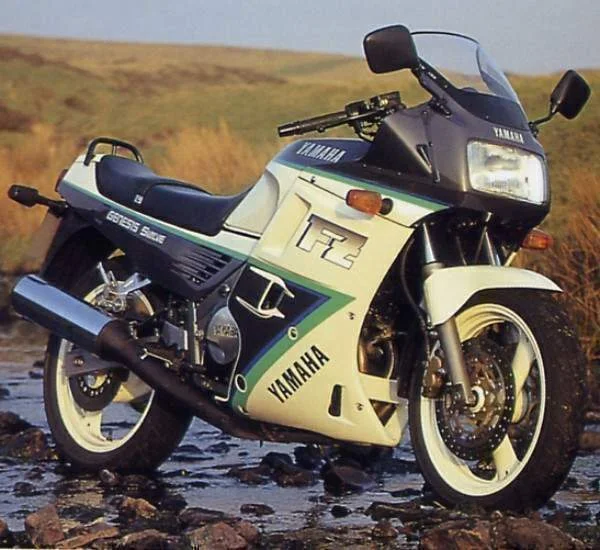1992 Yamaha FZ 750

Review of 1992 Yamaha FZ 750
The 1992 Yamaha FZ 750 stands as a remarkable example of the evolution of sport motorcycles during the early '90s. With its innovative design and advanced engineering, the FZ 750 introduced features that were ahead of its time, including a powerful 749cc inline-four engine that delivered impressive performance while maintaining a balance of agility and stability. The unique Delta Box frame provided enhanced rigidity and handling, enabling riders to enjoy a confident experience on both twisty roads and tracks. Additionally, the FZ 750's distinctive styling, characterized by its sleek lines and aggressive stance, helped it stand out in a competitive market, making it not just a functional machine but also a desirable one for motorcycle enthusiasts. The value of the Yamaha FZ 750 lies in its combination of performance, innovation, and aesthetic appeal. As a pioneer in the sportbike category, it laid the groundwork for future models and contributed significantly to Yamaha's reputation as a leader in motorcycle manufacturing. Today, the FZ 750 is cherished by collectors and riders alike, appreciated for its nostalgic charm and the raw riding experience it offers. Its rarity in the used motorcycle market, coupled with its historical significance, makes it a compelling choice for those seeking a blend of performance and classic style. In essence, the 1992 Yamaha FZ 750 is not just a motorcycle; it is a piece of motorcycling history that continues to evoke passion and admiration among fans of the sport.
Advantages
- Performance: The FZ 750 is equipped with a powerful inline-four engine that delivers impressive acceleration and top-end speed, making it a thrilling ride for enthusiasts.
- Handling: Designed with a lightweight frame and advanced suspension for its time, the bike offers excellent handling and stability, allowing riders to navigate corners with confidence.
- Comfort: The FZ 750 features a more upright riding position compared to many sportbikes of its era, providing a comfortable ride for both short commutes and longer journeys.
- Innovative Technology: It was one of the first motorcycles to introduce the concept of the “Delta Box†frame and a 5-valve per cylinder engine, showcasing Yamaha's commitment to innovation and performance.
- Cult Following: As a classic sportbike, the FZ 750 has developed a loyal fan base and is appreciated by collectors, making it a unique addition to any motorcycle enthusiast's garage.
Disadvantages
- Weight: The FZ 750 is relatively heavy compared to more modern sportbikes, which can affect handling and agility, especially in tight corners.
- Limited Aftermarket Support: As a classic bike, the availability of aftermarket parts and accessories may be limited, making it harder to find replacements or upgrades.
- Old Technology: The bike features outdated technology, such as its suspension and braking systems, which may not perform as well as those found on contemporary motorcycles.
- Vibration: Riders often report a noticeable amount of vibration at higher RPMs, which can lead to discomfort during longer rides.
- Fuel Economy: The FZ 750 may not be as fuel-efficient as newer models, making it less ideal for riders looking for a bike with better fuel economy for daily commuting.
Alternatives
- Kawasaki Ninja 750 (ZX-7) - The Kawasaki Ninja 750, also known as the ZX-7, was a sportbike known for its sharp handling and powerful inline-four engine. Launched in the early '90s, it offered a combination of performance and agility, making it a popular choice among sportbike enthusiasts. With its aggressive styling and race-inspired features, the ZX-7 was a formidable competitor in the middleweight sportbike category.
- Honda CBR 600F2: The Honda CBR 600F2 is a celebrated model from the early '90s that helped define the sportbike genre. It featured a lightweight frame, a rev-happy 600cc engine, and a balanced chassis that provided excellent handling. The CBR 600F2 was known for its versatility, making it suitable for both spirited rides and daily commuting, while also excelling on the racetrack.
- Suzuki GSX-R750 - The Suzuki GSX-R750 has a storied legacy as one of the original sportbikes, known for its power-to-weight ratio and race-ready performance. In the early '90s, it offered a liquid-cooled, inline-four engine that delivered impressive acceleration and handling capabilities. The GSX-R750's aggressive styling and commitment to performance made it a favorite among riders looking for a blend of street and track capabilities.
- Kawasaki ZXR750: The Kawasaki ZXR750, known for its advanced technology and performance, was a key player in the sportbike market during the early '90s. It featured a strong 750cc engine, lightweight aluminum frame, and aerodynamic bodywork. The ZXR750 was praised for its handling and stability, making it a top choice for those who enjoyed both spirited riding and track days.
- Yamaha YZF 750R: The Yamaha YZF 750R, introduced in the mid-90s, was designed with racing in mind and built on the success of the FZ series. It boasted a powerful inline-four engine and advanced suspension technology, offering a smooth and responsive riding experience. With its aggressive styling and performance-oriented features, the YZF 750R quickly became a strong contender in the sportbike segment, appealing to both racers and street riders alike. These motorcycles provide a variety of options for riders seeking performance and agility similar to the Yamaha FZ 750, each with its own unique attributes and characteristics.

Comments & Discussion